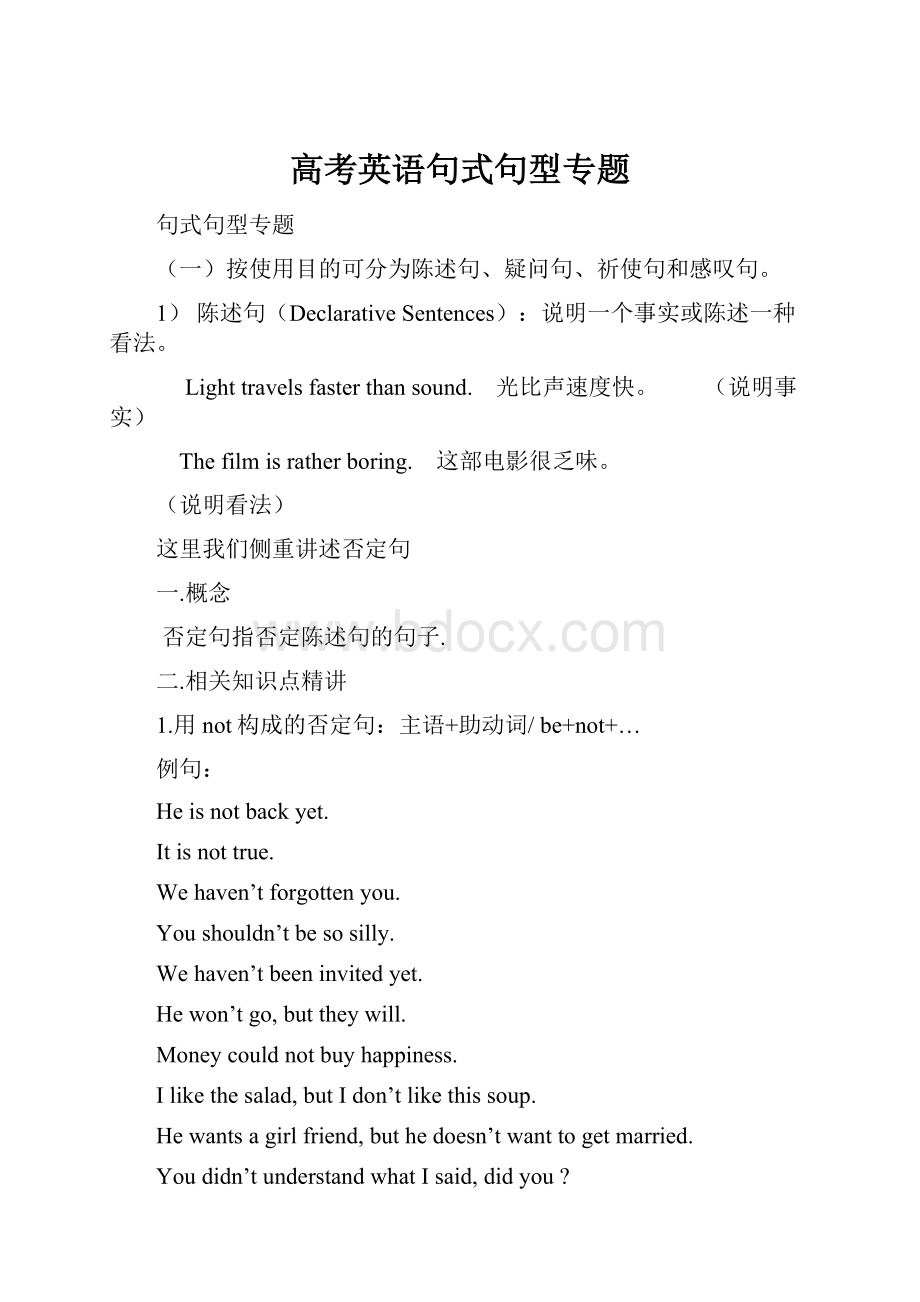高考英语句式句型专题.docx
《高考英语句式句型专题.docx》由会员分享,可在线阅读,更多相关《高考英语句式句型专题.docx(14页珍藏版)》请在冰豆网上搜索。

高考英语句式句型专题
句式句型专题
(一)按使用目的可分为陈述句、疑问句、祈使句和感叹句。
1)陈述句(DeclarativeSentences):
说明一个事实或陈述一种看法。
Lighttravelsfasterthansound. 光比声速度快。
(说明事实)
Thefilmisratherboring. 这部电影很乏味。
(说明看法)
这里我们侧重讲述否定句
一.概念
否定句指否定陈述句的句子.
二.相关知识点精讲
1.用not构成的否定句:
主语+助动词/be+not+…
例句:
Heisnotbackyet.
Itisnottrue.
Wehaven’tforgottenyou.
Youshouldn’tbesosilly.
Wehaven’tbeeninvitedyet.
Hewon’tgo,buttheywill.
Moneycouldnotbuyhappiness.
Ilikethesalad,butIdon’tlikethissoup.
Hewantsagirlfriend,buthedoesn’twanttogetmarried.
Youdidn’tunderstandwhatIsaid,didyou?
Youneedn’ttrytoexplain.
Ididn’tusetolikeopera,butnowI’mgettinginterested.
2.祈使句的否定句:
Don’t+动词原形…。
例句:
Don’tworry.I’lllookafteryou.
Don’tbelieveawordhesays.
Don’tbesorude.
3.非谓语动词(不定式,分词,动名词)的否定式:
把not放在todo;doing;的前面。
It’simportantnottoworry.
Hesaidhedeeplyregrettednotbeingabletohelp.
Notknowingwhattodo,Shellyaskedadviceofherfriend.
Hereproachedmefornothavingtoldittohim.
4.not与除谓语以外的其他句子成分连用:
Comeearly,butnotbeforesix.
It’sworking,butnotproperly.
Ibelievehewillsucceed,thoughnotwithoutsomedifficulty.
not用在Ihope;Ibelieve;I’mafraid;Iguess;Isuppose;Iexpect之后,构成省略句。
—Willitsnowtoday?
—Ihopenot.
5.用no构成否定句:
no+名词(单,复数,不可数)相当于not+a+名词/not+any+名词
Nomachinewouldworkforlongifitwerenotproperlylubricated.
ThenationsofEuropeandAmericahavefoundthatnocountrycanproduceallitsneedswithouttrading.
Takethattowel,Ihavenoother.
Icanwalknofarther.
Thereisnoknowingwhatwillhappen.
6.某些否定副词或代词:
seldom;never;hardly;rarely;little;few;none;nowhere;neither等在句中构成否定句:
Icanseldomfindtimeforreading.
Mirrortellsonlythefacts,neverthepoetry.
Therumorcamefromnowhere.
Nonebutfoolshaveeverbelievedit.
7.否定转移:
当think;believe;suppose;imagine等动词引导否定意义的宾语从句时,把从句中的not提到主句这些动词前面,是主句变成否定句:
Idon’tthinkshe’sathome,butI’llgoandsee.
Idon’timaginethathe’llenjoyit.
句式句型专题
(二):
疑问句
2)疑问句(InterrogativeSentences):
提出问题。
有以下四种:
a. 一般疑问句(GeneralQuestions):
Canyoufinishtheworkintime?
你能按时完成工作吗?
b. 特殊疑问句(WQuestions;HQuestions):
Wheredoyoulive?
你住那儿?
Howdoyouknowthat?
你怎么知道那件事?
c. 选择疑问句(AlternativeQuestions):
Doyouwantteaorcoffee?
你是要茶还是要咖啡?
d. 反意疑问句(Tag-Questions):
这里我们测重讲解反意疑问句
1) 陈述部分的主语是I,疑问部分要用aren'tI.
I'mastallasyoursister,aren'tI?
2) 陈述部分的谓语是wish,疑问部分要用may+主语。
Iwishtohaveawordwithyou,mayI?
3) 陈述部分用no,nothing,nobody,never,few,seldom,hardly,rarely,little等否定含义的词时,疑问部分用肯定含义。
TheSwedemadenoanswer,didhe/she?
Someplantsneverblown(开花),dothey?
4) 含有oughtto的反意疑问句,陈述部分是肯定的,疑问部分用shouldn't/oughtn't+主语。
Heoughttoknowwhattodo,oughtn'the?
/shouldn'the?
5) 陈述部分有haveto+v.(hadto+v.),疑问部分常用don't+主语(didn't+主语)。
Wehavetogetthereateighttomorrow,don'twe?
6) 陈述部分的谓语是usedto时,疑问部分用didn't+主语或usedn't+主语。
Heusedtotakepicturesthere,didn'the?
/usedn'the?
7) 陈述部分有hadbetter+v.疑问句部分用hadn'tyou?
You'dbetterreaditbyyourself,hadn'tyou?
8) 陈述部分有wouldrather+v.,疑问部分多用wouldn't+主语。
Hewouldratherreadittentimesthanreciteit,wouldn'the?
9) 陈述部分有You'dliketo+v.疑问部分用wouldn't+主语。
You'dliketogowithme,wouldn'tyou?
10)陈述部分有must的疑问句,疑问部分根据实际情况而定。
Hemustbeadoctor,isn'the?
YoumusthavestudiedEnglishforthreeyears,haven'tyou?
/didn'tyou?
Hemusthavefinishedityesterday,didn'the?
11)感叹句中,疑问部分用be+主语。
Whatcolours,aren'tthey?
Whatasmell,isn'tit?
12) 陈述部分由neither…nor,either…or连接的并列主语时,疑问部分根据其实际逻辑意义而定。
NeitheryounorIamengineer,arewe?
13) 陈述部分主语是指示代词或不定代词everything,that,nothing,this,疑问部分主语用it。
Everythingisready,isn'tit?
14) 陈述部分为主语从句或并列复合句,疑问部分有三种情况:
a.并列复合句疑问部分,谓语动词根据邻近从句的谓语而定。
Mr.SmithhadbeentoBeijingforseveraltimes,heshouldhavebeeninChinanow,shouldn'the?
b.带有定语从句,宾语从句的主从复合句,疑问部分谓语根据主句的谓语而定:
Heisnotthemanwhogaveusatalk,ishe?
HesaidhewantedtovisitJapan,didn'the?
c.上述部分主句谓语是think,believe,expect,suppose,imagine等引导的定语从句,疑问部分与宾语从句相对应构成反意疑问句。
Idon'tthinkheisbright,ishe?
Webelieveshecandoitbetter,can'tshe?
15)陈述部分主语是不定代词everybody,anyone,somebody,nobody,noone等,疑问部分常用复数they,有时也用单数he。
Everyoneknowstheanswer,don'tthey?
(doeshe?
)
Nobodyknowsaboutit,dothey?
(doeshe?
)
16)带情态动词dare或need的反意疑问句,疑问部分常用need(dare)+主语。
Weneednotdoitagain,needwe?
Hedarenotsayso,dareyou?
当dare,need为实义动词时,疑问部分用助动词do+主语。
Shedoesn'tdaretogohomealone,doesshe?
17) 省去主语的祈使句的反意疑问句,疑问部分用willyou。
Don'tdothatagain,willyou?
Gowithme,willyou/won'tyou?
注意:
Let's开头的祈使句,后用shallwe?
Letus开头的祈使句,后用willyou?
Let'sgoandlistentothemusic,shallwe?
Letuswaitforyouinthereading-room,willyou?
18) 陈述部分是"therebe"结构的,疑问部分用there省略主语代词。
Thereissomethingwrongwithyourwatch,isn'tthere?
Therewillnotbeanytrouble,willthere?
19) 否定前缀不能视为否定词,其反意疑问句仍用否定形式。
Itisimpossible,isn'tit?
Heisnotunkindtohisclassmates,ishe?
20) must在表"推测"时,根据其推测的情况来确定反意疑问句。
Hemustbetherenow,isn'the?
Itmustbegoingtoraintomorrow,won'tit?
快速记忆表
陈述部分的谓语 疑问部分
I aren'tI ?
Wish may+主语 ?
no,nothing,nobody,never,
few,seldom,hardly, 肯定含义
rarely,little等否定含义的词
oughtto(肯定的) shouldn't/oughtn't+主语
haveto+v.(hadto+v.) don't+主语(didn't+主语)
usedto didn't+主语或usedn't+主语
hadbetter+v. hadn'tyou
wouldrather+v. wouldn't+主语
you'dliketo+v. wouldn't+主语
must 根据实际情况而定
感叹句中 be+主语
Neither…nor,
either…or连接的根 据其实际逻辑意义而定
并列主语
指示代词或不定代词
everything,that, 主语用it
nothing,this
并列复合句 谓语根据邻近从句的谓语而定
定语从句,宾语从句的
主从复合句 根据主句的谓语而定
think,believe,expect,
suppose,imagine等引导 与宾语从句相对应的从句
everybody,anyone,
somebody,nobody,noone 复数they,单数he
情态动词dare或need need(dare)+主语?
dare,need为实义动词 do+主语 ?
省去主语的祈使句 willyou?
Let's开头的祈使句 Shallwe?
Letus开头的祈使句 Willyou?
therebe 相应的谓语动词+there(省略主语代词)
否定前缀不能视为否定词 仍用否定形式
must表"推测" 根据其推测的情况来确定反意疑问句
注意:
怎样回答反意疑问句?
It'sverycoldtoday,isn'tit?
你该怎么回答呢?
首先,我们来回顾一下怎样回答一般疑问句。
Areyouon-linenow?
(你在上网吗?
)当然啦,你的回答应该是肯定的。
否则就不会看到这篇文章了。
回答应该是:
Yes,Iam.
你正在看电视吗?
AreyouwatchingTVnow?
肯定没有啦,你就应该说:
No,I'mnot.现在你可以总结出来,该怎么回答一般疑问句了吧?
!
对,就是根据实际情况回答,Yes,Ido.或者No,Idon't.
反意疑问句的回答法跟一般疑问句的回答方式完全一样。
例如:
SheisgoodatEnglish,isn'tshe?
回答可以是:
Yes,sheis.或者No,sheisn't.注意,回答一定要和实际情况相符合,“是”就“是”,“不是”就“不是”。
也就是说回答反意疑问句要遵循“实事求是”的原则,肯定的答案就用yes+肯定结构;否定的答案就用no+否定结构。
答案要和实际情况相符。
那怎样回答Thereisacomputerinyourroom,isn'tthere?
这个句子呢?
你房间里确实有台电脑,那么回答就是:
Yes,thereis.不过,我们现在只练习了一种反意疑问句,即:
前一部分为肯定式,后一部分是否定式。
反意疑问句还有一种形式,就是:
前一部分是否定式,后一部分是肯定式。
Thereisn'tacomputerinyourroom,isthere?
“你的房间里没有电脑,对吗?
”你该怎么回答呢?
根据中国人的思维,反应在你脑海中的肯定是,“不对,我房间里有电脑。
”便顺口回答道:
No,thereis.这样,可就大错特错了。
因为你违背了“事实求是”的原则:
肯定的答案就用yes+肯定结构;否定的答案就用no+否定结构。
所以刚刚那句话的回答应该是:
Yes,thereis.
总之,回答反意疑问句就得记住一点:
实事求是。
记住了?
不管是做人还是回答反意疑问句都是一样的。
OK.Youdon'thaveanyquestions,doyou?
你怎么回答呢?
希望是--No,Idon't.
三.巩固练习
1.It’safineday,Let’sgofishing,_____?
A.won’tweB.willweC.don’tweD.shallwe
2.Frankisworkinglateagain.Thisisthefirsttimethisweekhe’shadtostudylate,____?
A.isn’theB.hasn’titC.hasn’theD.isn’tit
3.—Daddy’sforgottoposttheletteragain,____?
—I’mafraidhe___.
A.has;hasB.isn’t;isC.hasn’t;hasD.has;hasn’t
4.—Sorry,I’mnotfeelingwellandIdon’tthinkIcanfinish.
—Don’tworry.Letusdoitforyou,____?
A.willyouB.shallweC.shan’tweD.shallyou
5.Idon’tthinkhecouldhavedonesuchastupidthinglastnight,____?
A.doIB.couldheC.didheD.hashe
6.—Thegroundiswet.
—Itmusthaverainedlastnight,____?
A.hasn’titB.didn’titC.mustn’titD.isn’tit
7.—Jennydoesn’tthinkthatRobertishonest,___?
—I’mafraidnot.
A.isheB.isn’theC.doessheD.doesn’tshe
8.—Thenewwindowsneedwashing.
—Well,let’swashthemtogether,____?
A.shallweB.willyouC.shouldweD.wouldyou
9.Thereislittlewecandoaboutit,____?
A.isthereB.can’tweC.isn’tthereD.canwe
10.—Theproblemwasn’tdifficultforhim,wasit?
—______.Heshouldhavebeengivenamoredifficultone.
A.No,itwasB.Yes,itwasC.Yes,itwasn’tD.No,itwasn’t
四.答案
DDCACBCAAD
句式句型专题(三):
祈使句
3)祈使句(ImperativeSentences):
提出请求,建议或发出命令,例如:
一.概念
祈使句用以表达命令,要求,请求,劝告等。
二.相关知识点精讲
1.祈使句有三种类型,一种是以动词原形开头,(但只限于省略第二人称主语的句子)。
例如:
Takethisseat.坐这儿。
Dobecareful.务必小心。
否定结构:
例如:
Don'tmove.不准动。
Don'tbelate.不要迟到。
2.以let开头的祈使句
Let的反意疑问句:
a.Let's包括说话者。
例如:
Let'shaveanothertry,shallwe/shan'twe?
=Shallwehaveanothertry?
我们再试一次,如何?
b.Letus不包括说话者。
例如:
Letushaveanothertry,willyou/won'tyou?
=Willyoupleaseletushaveanothertry?
你让我们再试一次,好吗?
否定结构:
例如:
Let'snottalkofthatmatter.不要谈这件事。
Letusnottalkofthatmatter.你不要让我们谈这件事。
3.有主语的祈使句
2003年高考英语试卷上有这样一道单项填空题:
-Sorry,Joe.Ididn'tmeanto...
-Don'tcallme"Joe".I'mMrParkertoyou,and________youforgetit!
A.doB.didn'tC.didD.don't
-对不起,乔。
我不是故意要……
-不要叫我"乔",叫我帕克先生,你别忘记了。
答语的后半句是一个祈使句,表示警告对方,要以don't开头,故正确答案是D。
这道题的正确答案是D。
该题主要考查有主语的祈使句的用法。
我们知道,祈使句的主语通常就是说话的对方,即第二人称you,一般不表示出来,但在有些情况下,祈使句也可带主语。
一、为了强调指明向谁提出要求或发出命令时。
例如:
Yougowithme.你跟我去。
YoutellhimwhatIsaid.你把我说的话告诉他。
Youtakethatseat.你坐在那个座位上。
二、表达"气愤;不满;厌烦